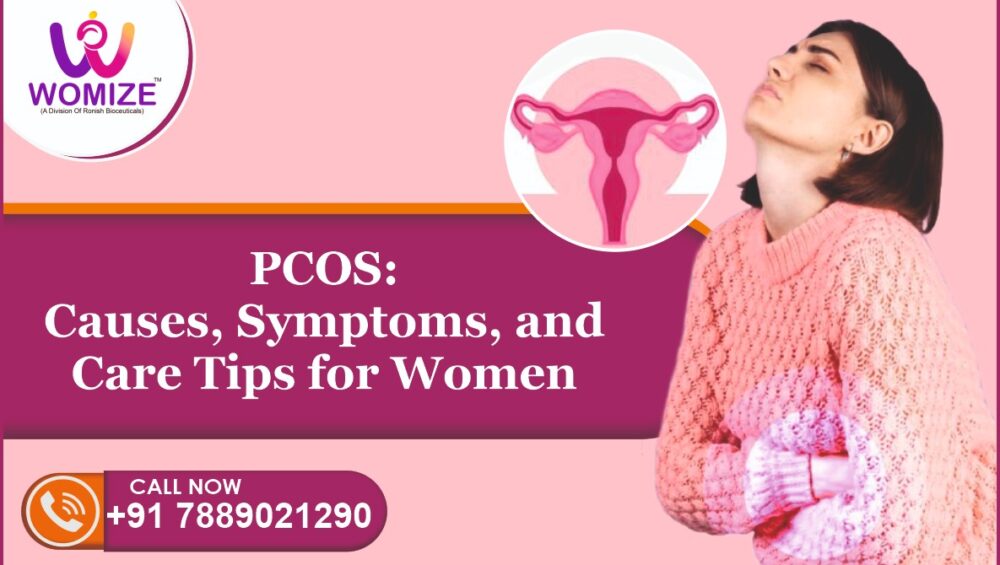Polycystic Ovary Syndrome (PCOS) is one of the most common hormonal disorders that affects women of reproductive age. It can cause irregular periods, hormonal imbalance, and difficulty in conceiving. With rising lifestyle changes and stress levels, PCOS cases are increasing rapidly across India. Understanding its causes, symptoms, and care tips is essential for managing this condition effectively. Womize, a trusted name guided by expert Gynecology Specialists, shares key insights into PCOS management and women’s health awareness.
Understanding PCOS and Its Impact on Women
PCOS (Polycystic Ovary Syndrome) affects how a woman’s ovaries work. The condition is marked by the presence of small cysts on the ovaries, which disrupt the normal release of eggs. This hormonal imbalance leads to several physical and emotional symptoms that affect daily life and fertility.
Women with PCOS often have higher levels of androgens (male hormones) that cause issues like acne, excess hair growth, and weight gain. Gynecology Specialists recommend early diagnosis and lifestyle correction to reduce long-term complications such as diabetes, hypertension, and infertility.
Causes of PCOS
The exact cause of PCOS is still not clearly known, but several factors contribute to its development. Womize explains some of the major causes below:
1. Hormonal Imbalance
One of the most common causes is an imbalance in hormones such as insulin and androgens. High insulin levels can increase androgen production, leading to irregular ovulation and cyst formation.
2. Genetic Factors
PCOS can run in families. If your mother or sister has it, your chances of developing the condition may increase. This hereditary link makes regular health checkups vital.
3. Insulin Resistance
Many women with PCOS have insulin resistance, which means their body’s cells don’t respond properly to insulin. This leads to increased blood sugar levels, which further increase androgen levels and worsen PCOS symptoms.
4. Inflammation
Research shows that women with PCOS often have low-grade inflammation that can stimulate the ovaries to produce more androgens, affecting fertility and overall health.
Common Symptoms of PCOS
Recognizing the symptoms early can help manage PCOS effectively. Womize and experienced Gynecology Specialists list the common signs below:
1. Irregular Menstrual Cycle
Women with PCOS may experience irregular or missed periods due to disrupted ovulation.
2. Excess Hair Growth
Excessive facial or body hair, also known as hirsutism, is caused by increased androgen levels.
3. Acne and Oily Skin
Hormonal imbalance can cause persistent acne, especially on the face, chest, and back.
4. Weight Gain
Many women with PCOS struggle with weight gain, particularly around the waist area.
5. Hair Thinning
PCOS can cause hair thinning or male-pattern baldness due to elevated androgen levels.
6. Difficulty in Conceiving
Irregular ovulation makes it challenging for women to get pregnant naturally.
If you experience two or more of these symptoms, consulting a Gynecology Specialist is highly recommended for proper diagnosis and treatment.
Diagnosis and Medical Support
Diagnosis of PCOS involves a combination of physical examination, blood tests, and ultrasound imaging. Womize emphasizes the importance of early screening by Gynecology Specialists to prevent long-term complications.
Doctors typically check hormone levels, blood sugar, and cholesterol levels. Ultrasound helps identify cysts on the ovaries and assess their size and number. Early detection ensures timely management through medication and lifestyle modification.
Care Tips for Managing PCOS
PCOS is a lifelong condition, but proper care and discipline can help women maintain hormonal balance and improve fertility. Here are some practical care tips supported by Womize and top Gynecology Specialists:
1. Maintain a Healthy Diet
Focus on a balanced diet rich in fiber, lean proteins, and healthy fats. Avoid sugary and processed foods that can raise insulin levels. Including fruits, vegetables, and whole grains helps control weight and improve metabolism.
2. Exercise Regularly
Regular physical activity improves insulin sensitivity and supports weight management. Activities like yoga, walking, cycling, and strength training can be highly effective for women with PCOS.
3. Manage Stress
Stress increases cortisol levels, which can further disrupt hormonal balance. Practicing mindfulness, meditation, and deep breathing exercises helps reduce stress and improve mental well-being.
4. Monitor Menstrual Cycle
Keeping track of your periods helps identify irregularities early. Using mobile health apps or a simple calendar can assist in understanding your body’s rhythm.
5. Sleep Well
Poor sleep can worsen PCOS symptoms. Aim for at least 7–8 hours of restful sleep every night to support hormonal health.
6. Regular Medical Checkups
Consult Gynecology Specialists for routine checkups. Continuous monitoring ensures that any changes in symptoms are addressed promptly with medical support.
Medical Treatment Options
While lifestyle changes are the first line of defense, medical treatments may also be needed. Womize supports holistic treatment approaches recommended by Gynecology Specialists, which may include:
- Oral contraceptives to regulate menstrual cycles
- Insulin-sensitizing agents for managing insulin resistance
- Fertility medications for women trying to conceive
- Anti-androgen medicines to reduce acne and hair growth
Treatment plans vary for each patient depending on their symptoms and overall health condition.
Long-Term Health Risks of PCOS
If left untreated, PCOS can increase the risk of several chronic conditions. These include:
- Type 2 diabetes
- High blood pressure
- Heart disease
- Endometrial cancer
- Depression and anxiety
Therefore, proactive management and continuous consultation with Gynecology Specialists are necessary to maintain long-term wellness.
Lifestyle and Emotional Support
Living with PCOS can be emotionally challenging. Support from family, friends, and healthcare professionals can make a significant difference. Womize encourages women to share their concerns openly with Gynecology Specialists and participate in PCOS awareness programs to build a positive mindset.
Conclusion
PCOS is a manageable condition with the right balance of medical treatment and lifestyle care. Early diagnosis, proper guidance from Gynecology Specialists, and healthy daily habits can help women lead a normal, active life. Womize is committed to promoting women’s wellness through its range of quality healthcare solutions and professional gynecological support.
We offer Gynecological PCD Pharma Franchise to wholesalers, doctors, and MRS to strengthen healthcare delivery across India. Partner with the Best PCD Pharma Company in India to contribute to better women’s health and awareness.
FAQs
1. Can PCOS be cured permanently?
PCOS cannot be completely cured, but its symptoms can be managed effectively through proper diet, exercise, and medical treatment.
2. Does PCOS affect fertility?
Yes, PCOS can cause ovulation issues that affect fertility, but timely treatment and support from Gynecology Specialists can improve conception chances.
3. What foods should be avoided with PCOS?
Avoid refined carbs, sugary drinks, fried foods, and processed snacks as they can worsen insulin resistance and hormonal imbalance.
4. How often should I consult a gynecologist for PCOS?
Regular checkups every 3 to 6 months are recommended to monitor symptoms and adjust treatment plans as needed.
5. Can lifestyle changes alone help manage PCOS?
For mild cases, lifestyle changes like healthy eating, regular exercise, and stress management can significantly control PCOS symptoms.




